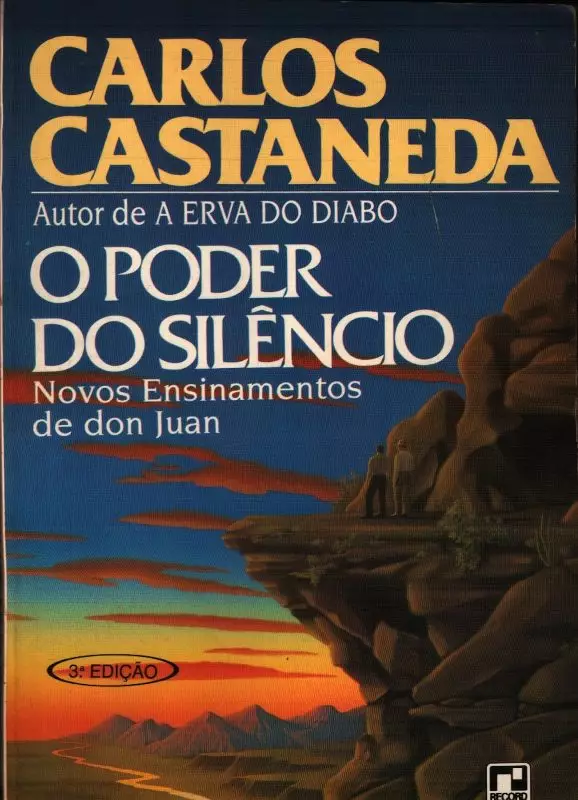In the previous issue of this journal, the first premise of the warriors’ way was stated as: We Are Perceptors. Perceptors was used in place of perceivers. This was not an error, but the desire to extend the use of the Spanish language term perceptor, which is very active, in order to connote in English the urgency of being a perceiver. In this journal of applied hermeneutics, the problem of enhancing the meaning of a term by propping it with a foreign cognate is going to arise quite often; sometimes even to the point of forcing the creation of a new term; not as a show of snobbery, but because of the inherent need to describe some sensation or experience or perception that has either never been described before, or if it has, it has escaped our knowledge. The implication is that our knowledge, no matter how adequate it might be, is limited.
The second premise of the warriors’ way is called WE ARE WHAT OUR INCEPTION IS. This is one of the most difficult premises of the warriors’ way; not so much because of its complexity or rarity, but because it is nearly impossible for any of us to admit certain conditions pertaining to ourselves, conditions which sorcerers have been aware of over the millennia.
The first time don Juan Matus began to explain this premise, I thought he was joking, or that he was merely trying to shock me. He was teasing me at the time about my stated concern with finding love in life. He had asked me once what were my aims in life. Since I couldn’t come up with any intelligible answer, I replied to him half-jokingly that I wanted to find love.
“The search for love, for the people who reared you, meant having sex,” don Juan had said to me on that occasion. “Why don’t you call a spade a spade? You are in search of sexual satisfaction, true?”
I denied it, of course. But the topic remained with don Juan as a source for teasing me. Every time I saw him, he would find or construct the proper context to ask me about my search for love, i.e. sexual satisfaction.
The first time he discussed the second premise of the warriors’ way he began by teasing me, but suddenly he became very serious.
“I recommend that you change venues,” he said, “and abstain totally from continuing your search. It will lead you nowhere at best; at worst, it will lead you to your downfall.”
“But why, don Juan, why must I give up sex?”
I asked in a plaintive voice.
“Because you are a bored fuck,” he said. “What is that, don Juan? What do you mean, bored fuck?”
“One of the most serious things warriors do,” don Juan explained, “is to search, confirm, and realize the nature of their inception. Warriors must know as accurately as they can whether their parents were sexually excited when they conceived them, or whether they were merely fulfilling a conjugal function. Civilized lovemaking is very, very boring to the participants. Sorcerers believe, without a shadow of a doubt, that children conceived in a civilized fashion are the products of a very bored … fuck. I don’t know what else to call it. If I used another word, it would be a euphemism, and it would lose its punch.”
After being told this incessantly, I began to ponder seriously what he was talking about. I thought I had understood him. Then doubt crept up on me every time and I found myself asking the same question: “What is a bored fuck, don Juan?” I suppose I unconsciously wanted him to repeat what he had already said dozens of times.
“Don’t begrudge my repetition,” don Juan used to say to me every time. “It’ll take years of pounding before you admit that you are a bored fuck. So, I’ll repeat to you again: If there is no excitation at the moment of conception, the child that comes out of such a union will be intrinsically, sorcerers say, just as he was conceived. Since there is no real excitation between the spouses, but perhaps merely mental desire, the child must bear the consequences of their act. Sorcerers assert that such children are needy, weak, unstable, dependent. Those, they say, are the children that never, ever leave home; they stay put for life. The advantage of such beings is that they are extremely consistent in the midst of their weakness. They could do the same job for a lifetime without ever feeling the urge to change. If they happen to have a good, sturdy model as children, they grow to be very efficient, but if they fail to have a good pattern, there is no end to their anguish, turmoil and instability.
“Sorcerers say with great sadness that the enormous bulk of humanity was conceived like that. This is the reason we hear endlessly about the urge to find something that we don’t have. We search, for the duration of our lives, according to sorcerers, for that original excitation that we were deprived of. That’s why I said that you are a bored fuck. I see anguish and discontent written all over you. But don’t feel bad. I am also a bored fuck. There are very few people, in my knowledge, who are not.”
“What does this mean to me, don Juan?” I asked him once, genuinely alarmed.
Somehow don Juan had hit my inner core directly with every one of his words. I was exactly what he had described as the bored fuck reared in a bad pattern. Finally one day, it all boiled down to a crucial statement and question. I said:
“I admit I’m a bored fuck. What can I do?”
Don Juan laughed uproariously, tears coming to his eyes. “I know, I know,” he said, patting me on the back, trying to comfort me, I suppose. “To begin with, don’t call yourself a bored fuck.”
He looked at me with such a serious, concerned expression that I began to take notes.
“Write everything down,” he said encouragingly. “The first positive step is to use just the initials: B.F.”
I wrote this down before I realized the joke. I stopped and looked at him. He was veritably about to split his sides laughing. In Spanish, bored fuck is cojida aburrida, C. A., just like the initials of my birth name, Carlos Aranha.
When his laughter had subsided, don Juan seriously delineated a plan of action to offset the negative conditions of my inception. He laughed uproariously as he described me as not only an average B.F., but as one that had an extra charge of nervousness.
“In the warriors’ path,” he said, “nothing is finished. Nothing is forever. If your parents didn’t make you as they should have, remake yourself.”
He explained that the first maneuver of the sorcerers’ kit is to become a miser of energy. Since a B.F. does not have any energy, it is useless to waste the little bit that he has in patterns that are not adequate to the amount of energy available. Don Juan recommended that I abstain from engaging in pat- terns of behavior that demanded energy I did not have. Abstinence was the answer, not because this was morally correct or desirable, but because it was energetically the only way for me to store enough energy to be on par with those who were conceived under conditions of tremendous excitation.
The patterns of behavior he was talking about included everything that I did, from the way I tied my shoes, or ate, to the way I worried about my self- presentation, or the way I pursued my daily activity, especially when it referred to courtship. Don Juan insisted that I abstain from sexual intercourse, because I had no energy for it.
“All you accomplish in your sexual foragings,” he declared, “is to get yourself into states of profound dehydration. You get circles under your eyes; your hair is falling off; you have weird spots on your nails; your teeth are yellow; and your eyes are tearing all the time. Relationships with women cause you such nervousness that you devour your food without chewing it, so you’re always plugged up.”
Don Juan enjoyed himself immensely, telling me all this, which added enormously to my chagrin. His last remark was, however, like the act of throwing a lifesaver to me.
“Sorcerers say,” he went on, “that it is possible to turn a B.F. into something inconceivable. It is just a matter of intending it; I mean, intending the inconceivable. To do this, to intend the inconceivable, one must use anything that is available, anything at all.” “What is ‘anything at all,’ don Juan?” I asked, genuinely touched.
“Anything is anything. A sensation, a memory, a wish, an urge; perhaps fear, desperation, hope; perhaps curiosity.”
I didn’t quite understand this last part. But I understood it sufficiently to begin my struggle to get out from the underpinnings of a civilized conception. A lifetime later, the Blue Scout wrote a poem that explained it to me in full.
The Conception of a B.F. by the Blue Scout
She was made in an Arizonan trailer,
after a night of playing poker
and drinking beer with friends.
His foot got caught
in the torn lace of her nightie.
She smelled like a mixture of tobacco smoke
and Aqua Net hair spray.
He was thinking of his bowling score
when he found himself erect.
She was wondering how this life
could possibly last a lifetime.
She wanted to go to the bathroom
when she found herself pinned down.
He stifled a belch as she was conceived,
but luckily for her,
the two were in the desert,
and at that moment,
a coyote howled,
sending a chill of longing through the woman’s womb.
That chill was all she brought into this world.
(Carlos Castaneda, A Journal of Applied Hermeneutics)

